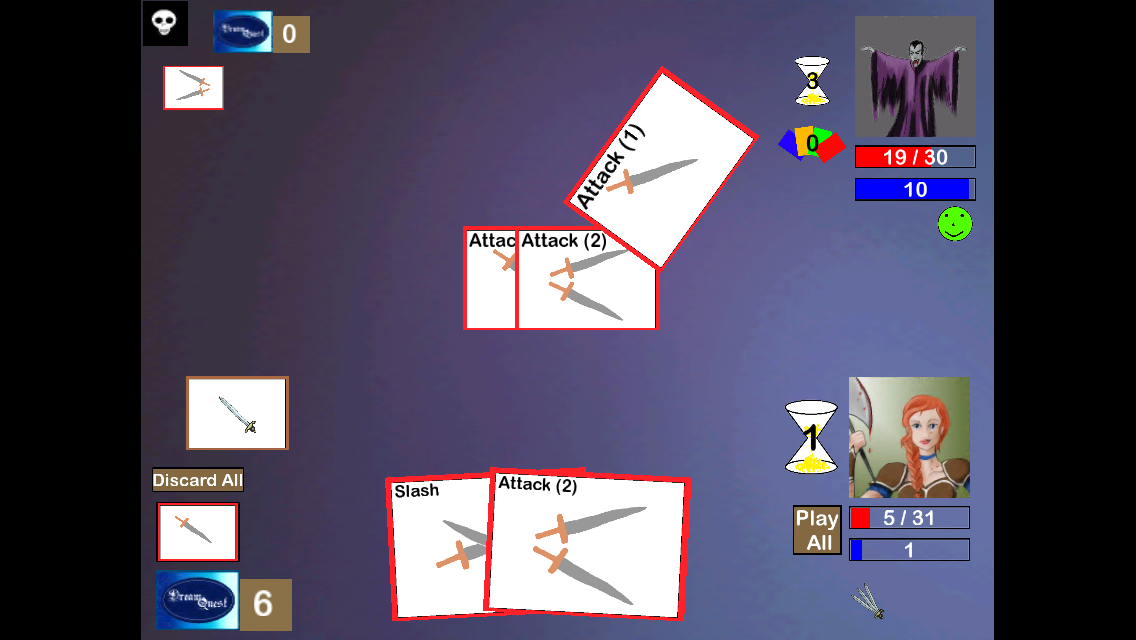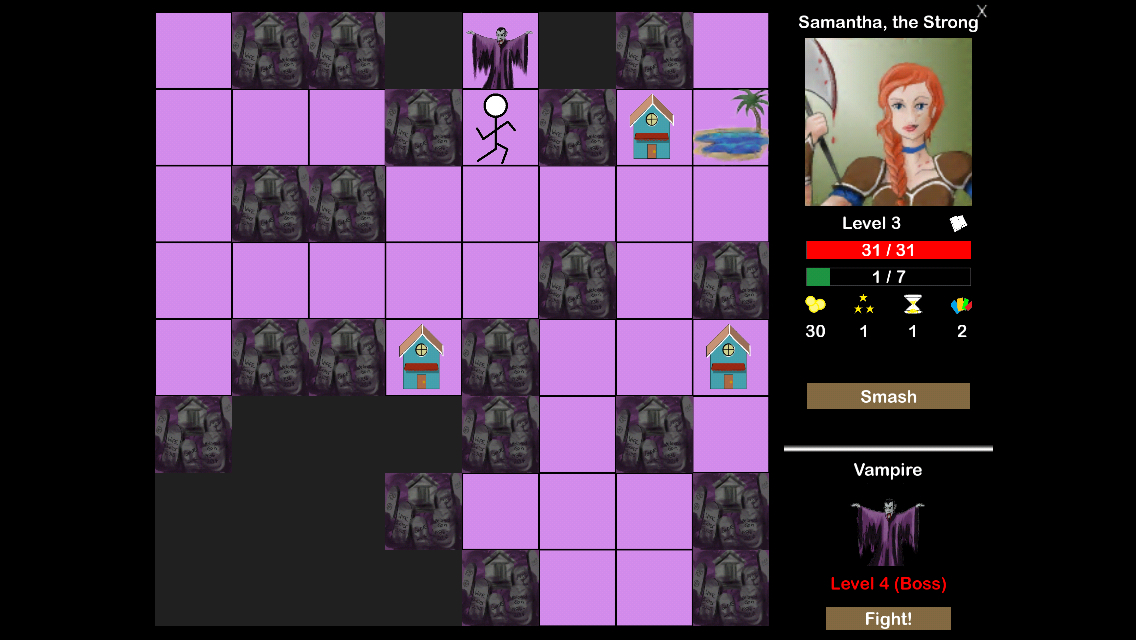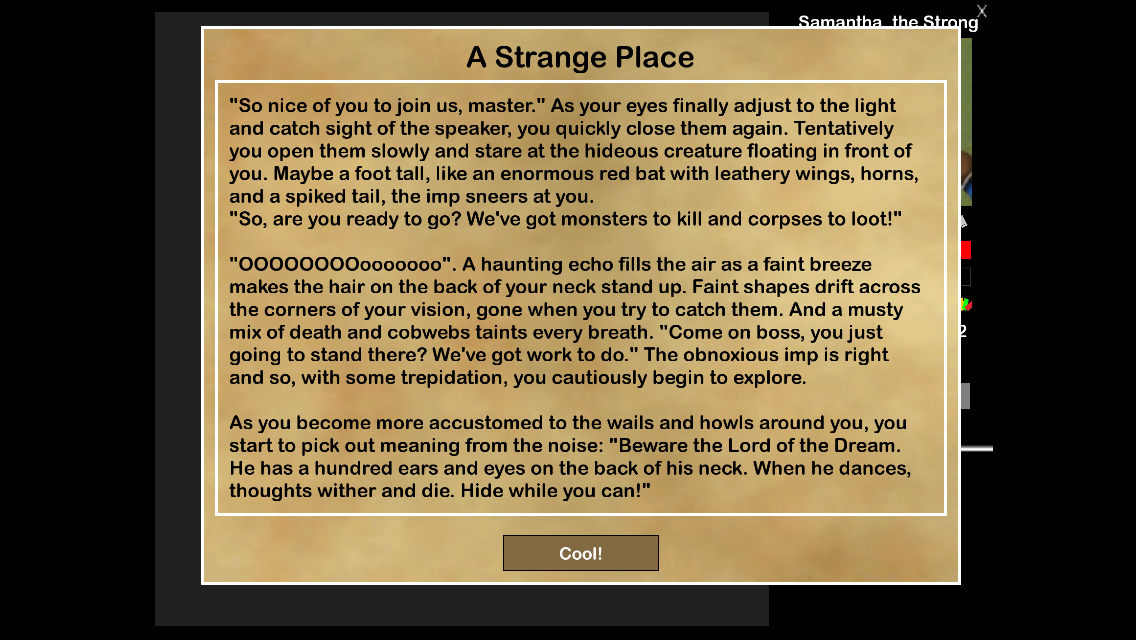 Card battles and rogue-likes probably aren’t a combination you necessarily think about, but that’s exactly what you get in Dream Quest ($2.99). It may sound weird, but it actually works very well, with some potentially deep gameplay that keeps you coming back for more. Unfortunately, outside of the battle system there’s a lot to be desired, but Dream Quest still has enough going for it to be worth exploring.
Card battles and rogue-likes probably aren’t a combination you necessarily think about, but that’s exactly what you get in Dream Quest ($2.99). It may sound weird, but it actually works very well, with some potentially deep gameplay that keeps you coming back for more. Unfortunately, outside of the battle system there’s a lot to be desired, but Dream Quest still has enough going for it to be worth exploring.
Dream Quest’s visuals are probably the first thing you’ll notice when you launch the game and, for the most part, they leave a lot to be desired. From the crudely drawn stick figures on the cards to the generic sprites on the game map, there’s really not much to enjoy. Granted, it’s not like rogue-like titles have a particularly high standard for visual quality, but Dream Quest doesn’t exactly hit whatever low bar it’s been set at. Sure, I’m the first to admit that nice graphics aren’t necessary or even important for a rogue-like, but it’s still disappointing.

Dream Quest’s battle system is where the game gets interesting. When an enemy is encountered on the field you’re given the option to fight. Do so and you enter into a turn-based battle with cards acting as your weapons. Each turn allows you to draw (and keep) a certain amount of cards and the enemy does the same. While early battles will have you throwing all your cards at the opposition each turn, as you earn better and more nuanced cards it becomes an interesting balance of keeping cards and earning new cards to use.
While the rogue-like nature of Dream Quest means that you’ll lose all those pretty cards you earn during a run with each new playthrough, it does offer a few nuggets of of permanency that aid in replayability. Hitting in-game achievements offer small perks like starting a new run with more gold or traits while a simple scoring system lets players accumulate points that can eventually be cashed in to “unlock” achievement perks without actually hitting the criteria. I think adding elements like this to rogue-likes make each playthrough a bit more rewarding so I’m glad Dream Quest incorporates it.

Dream Quest offers a lot of cool ideas but I think it suffers a lot from a lack of refinement that affects other portions of the game. Obviously randomness is an inherent part of a rogue-like, but I felt that too many runs were unbalanced and left you in a position of impending death on the first floor. On a related note, I think the characters are pretty unbalanced as well, with one in particularly feeling overpowered while the rest seemed to inflate the difficulty of the already iffy randomization of the levels.
I also would have liked a way to to get a bit more variety in cards beyond the uniques for each of the character classes. The vast majority of cards seen are simple attack or mana regeneration cards, so early stages of a run (of which you’ll have many) can be a bit boring until you’ve gained a few levels and learned a few cards. Thankfully, Dream Quest gets better the further into a run you can get, although true to rogue-like form there’s a lot of luck involved simply to get further in.

Superficially it’s easy to overlook Dream Quest. However, once you get past its peculiar looks there’s a somewhat deep rogue-like that’s fascinating to play. The card-based battle system works well and there’s a lot of potential for enjoyment. The biggest disappointment is probably in the fact that so much of Dream Quest hinges on potential. I feel like there are so many secondary aspects that could be improved to make the overall game a better experience. Thankfully, the developers seem to be taking feedback to heart and have already made some improvements which should hopefully continue. Regardless, that battle system is mighty interesting and I think makes Dream Quest worth checking out.